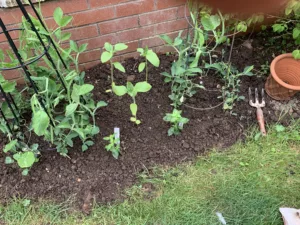 Planting sunflowers grown from seed.
Planting sunflowers grown from seed.
Does everyone have a book in them? as Christopher Hitchens allegedly said. But a story? Yes, possibly. An anecdote? Without a doubt.
One of the reasons I write is to make sense of who I am, in the culture I’m part of.
A couple have lived together for twenty years and one of them leaves the other without an explanation. Or thirty, forty years. I hear of it, read it in newspapers, someone says – You know so-and-so – and a story begins, is exaggerated to make it more entertaining. As a writer I want to explore what happened, why they might have separated, why on that particular day – say – and so I develop an idea.
I used to work in the Family Court helping couples who were unable to agree as to what arrangements they could make for their children. Which parent should they live with? What did the child/children want? Should care be shared – half the week with one parent, half with the other? If there were safeguarding or potential safeguarding issues, Social Services became involved and the Probation Service withdrew.
Quite often my role was to reassure the children that they were not the cause of the split, that the difficulties lay with the parents. Similarly, we (I worked as part of a team) also reassured the parents that it was their current relationship which was preventing them decide how best to make sure the children’s needs were taken into account.
The novel I’m currently preparing to send out to agents/publishers describes such a family crisis. The children aged 13 and 16 are not the cause of the breakdown. So, who is?
 Waiting for sunflower to bloom
Waiting for sunflower to bloom
In most arguments I begin with the premise that I’m right. When a couple has problems, the tendency is (though not always) is to blame the other. In realising that I am not always right, I need to examine my own behaviour through the eyes of someone else. If my argument is with a part of society – political or social for example – then I may need to reassess my opinion. That may challenge my family’s values, my conditioning.
Writing a story in which one partner leaves another apparently on a whim becomes a process of discovery. A story to which I do not know the ending, don’t know how they need to change in order to stay together. The story matters to me, because I change. Some stories are entertainment, an escape, others stories can make us feel uncomfortable and help us to change.
Reading: I finished In the Blood – Anna Fodorova. In some respects it’s a story about intergenerational conflict. A mother withholds information from her daughter in part because of their different perspectives on what happened to their Jewish ancestors in Prague. It struck me that each generation has its own experiences and it helps if they’re connect them. I dipped into The Long & Short of It, and other stories published by Emma Press. Very enjoyable and interesting perspective of young people. Look At You – Amanda Smyth. I was lucky enough to attend her launch in Waterstones, Leamington and enjoyed reading her novel. Recommended. I read it slowly – savoured and loved it. Maggie O’Farrell’s After You’d Gone – I’ve just started what I think was her debut novel. So far, so fascinating… Attended Conversation between Sophie Hannah and Nic Aubury at Leamington library. No one would do what the Lamberts have done was launched during that week. Promises to be a good read as does Nic Aubury’s book of short poems. I dipped into Pennine Platform, a poetry magazine and 44 Poems on Being with Each Other, edited by Pádraig ÓTuama. In particular I loved Eurydice, Turning by Rita Dove. I almost attended Abbi Johnson reading from The Secret Collector at Warwick Books, but wilted because of the heat. I have the novel and will read it soon.
 Light at the end of the day
Light at the end of the day
I love the sound of your family crisis book. That’s my kind of story!
Excellent, Fran! I’ve one potential reader. Thanks.
It was interesting to read about your background, Marg, and how well it must have fitted you to write about family breakdown from your own past professional experience. I do hope your submissions are successful.
Thank, Sheila. I’m doing what I hope is a final edit and will then send it out.
Amanda Smyth’s book is great, yes.
I really enjoyed this post. So interesting to learn about your background and how your experiences would inform your writing.
I recently read Haruki Murakami’s Novelist as a Vocation and he says some writers only have one book in them, but that book might be a masterpiece and maybe that’s all they were meant to write. I couldn’t help thinking of Harper Lee. He makes a lot of good points about different types of writers and the whole “writing game”, it’s a great read. More of a memoir than a how-to writing book.
Thanks, Nina! I’ll try Haruki Murakami’ s Novelist as a Vocation. I do think my writing develops the more I write. In some respects it’s like other skills. We’re always learning.